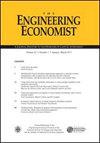Optimizing the quality level of raw materials based on material flow cost accounting in a production system with rework
IF 1.2
4区 经济学
Q4 BUSINESS
引用次数: 1
Abstract
Abstract The concept of Material Flow Cost Accounting (MFCA) was developed by a German textile company in late 1980s through their projects for environmental management. The major objectives of MFCA are to increase transparency of material flow and energy usage along with their environmental and financial impacts. MFCA traces a variety of measures from material productivity metrics to crucial environmental indexes. Most of the existing researches on MFCA focus on conceptual models. A major research gap is the lack of mathematical optimization models which use the MFCA logic to support managerial decisions. This is the first known study in which a comprehensive mathematical optimization model has been developed based on MFCA cost logic, i.e., positive and negative costs. The model is named MFCABOM (MFCA-Based Optimization Model) in this paper. In addition, we have incorporated the quality cost of raw materials into the MFCABOM. The MFCABOM determines the optimal quality level of raw materials in a production system with rework. A numerical example has been solved and discussed to assess the performance and validity of the MFCABOM. The results show that the MFCABOM can strongly support production managers in selecting the optimal quality level of raw materials based on MFCA cost logic.在有返工的生产系统中,基于物料流成本核算优化原材料质量水平
摘要物流成本核算(MFCA)的概念是由一家德国纺织公司在20世纪80年代末通过其环境管理项目提出的。MFCA的主要目标是提高材料流动和能源使用的透明度及其对环境和财务的影响。MFCA追踪了从材料生产率指标到关键环境指标的各种衡量标准。现有的MFCA研究大多集中在概念模型上。一个主要的研究空白是缺乏使用MFCA逻辑来支持管理决策的数学优化模型。这是已知的第一项基于MFCA成本逻辑(即正成本和负成本)开发综合数学优化模型的研究。本文将该模型命名为MFCABOM(基于MFCA的优化模型)。此外,我们已将原材料的质量成本纳入MFCABOM。MFCABOM确定了返工生产系统中原材料的最佳质量水平。为了评估MFCABOM的性能和有效性,对一个数值例子进行了求解和讨论。结果表明,MFCABOM可以有力地支持生产经理基于MFCA成本逻辑选择最佳原材料质量水平。
本文章由计算机程序翻译,如有差异,请以英文原文为准。
求助全文
约1分钟内获得全文
求助全文
来源期刊

Engineering Economist
ENGINEERING, INDUSTRIAL-OPERATIONS RESEARCH & MANAGEMENT SCIENCE
CiteScore
2.00
自引率
0.00%
发文量
14
审稿时长
>12 weeks
期刊介绍:
The Engineering Economist is a refereed journal published jointly by the Engineering Economy Division of the American Society of Engineering Education (ASEE) and the Institute of Industrial and Systems Engineers (IISE). The journal publishes articles, case studies, surveys, and book and software reviews that represent original research, current practice, and teaching involving problems of capital investment.
The journal seeks submissions in a number of areas, including, but not limited to: capital investment analysis, financial risk management, cost estimation and accounting, cost of capital, design economics, economic decision analysis, engineering economy education, research and development, and the analysis of public policy when it is relevant to the economic investment decisions made by engineers and technology managers.
 求助内容:
求助内容: 应助结果提醒方式:
应助结果提醒方式:


